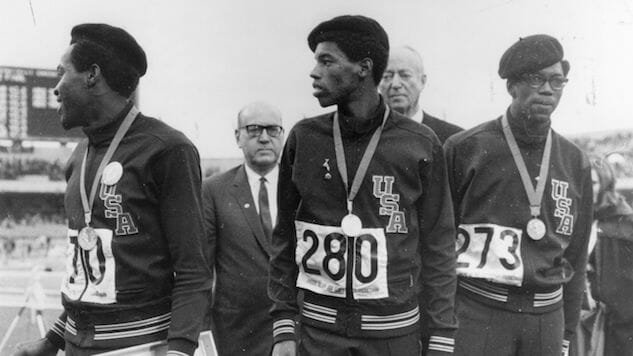No, Trump Did Not ‘Accelerate Liberal Sportswriting’: We’ve Been Here All Along
Photo by Keystone
I started writing about sports more than five years ago. My own life experience as a settlement counselor, offering support to newcomers to Canada, played a major role in this journey. As a frontline counselor, I used sports as a vehicle to reaching youth from marginalized and racialized communities, and sports and physical activity as tools for therapy for victims of domestic violence.This work with the most vulnerable members of society still influences much of my writing.
As a Muslim woman of colour, what interests me most is how our current, toxic political rhetoric and related events cross into sport. I write about misogyny, racism and other intersections of sports and politics. I am not a communist. I am not a “Social Justice Warrior”.
I am a sportswriter.
My lens is unique, as are the perspectives of my fellow colleagues: People of Colour, LGBTIQ folks or Persons with Disabilities. This should be seen as something positive, particularly in a field that the 2014 Women’s Media Center report states is 90% male. I would add that the overwhelming majority of these men are white, cis gender and able-bodied.
In that vein, Bryan Curtis of The Ringer, from the familiar smorgasbord of white male sports editors, published an opinion piece on how and why he believes sports writing has become a “Liberal Profession”. I am pretty certain there was smoke emanating from my ears and out of my hijab as I read it, encouragement enough for me to rant about it on Twitter.
Even if Curtis believed he was being fair in his piece by mentioning athletes like LeBron James and Steph Curry who have made statements that go addressing issues beyond the court, his piece was written for a male audience by a man about other men, some of whom have apparently brought about a “new world of liberal sports writing.”
I find it completely short-sighted that Curtis failed to mention any one of the sports media outlets such as espnW, The Undefeated, The Shadow League, Excelle Sports, Unusual Efforts, Media Diversified, ReWire, VICE Sports, The Relish and Outsports that, in some cases for years have committed resources to amplifying voices of sports writers and journalists who cover issues like race, culture, gender and systems of oppression in sports.
Some of these sites feature writers who identify as trans people, Black, Asian, Muslim, Jewish and everything in between. They commit to looking at issues that affect athletes, fans and sports culture. Though Curtis may not have realized it, these writers have been working hard for a long time to have a more inclusive discussion about sports for everyone, long before the rise of Donald Trump.
Christine Brennan for example is a staple in the sports media world. Her work has existed for years before Trump and his strident policies surfaced. She has chronicled the achievements of female athletes and their challenges for decades, written about Title IX and its’ importance in the inclusion of women in sports. She isn’t new to the scene. Perhaps Curtis is unfamiliar with such notable female sportswriters, a reason why he mentioned so few women (any?) in his piece. Nor does he mention James Bridget Gordon, a brilliant trans woman who wrote about the evils of xenophobia from American soccer players. Curtis seems to have missed all this.
Muhammad Ali is a brilliant example of drawing attention to the intersections of sports and and politics. He has been written of in ways that forced traditional sports media to delve into those issues. Ali spoke so brilliantly and was a force of life and an inspiration to many athletes, fans and yes, sports journalists- myself included. Contrary to what Curtis has said, it hasn’t been “quiet” in the days since Muhammad Ali spoke candidly. There have been tremendous instances of protest, and advocacy of social justice through sports: Dr. John Carlos and Tommie Smith, Billie Jean King, Mahmoud Abdul-Rauf and more recently female athletes like Indira Kaljo and Serena Williams. Their experiences are valuable to sports history. And it forced sports media to address (even vaguely) these issues.
Perhaps Curtis is correct that sports media has evolved considerably in the past few years, but this is merely a crucial first step in a world where a fight to control women’s bodies and discussions about a Muslim registry are par for the course. The stakes are too high to be nostalgic for a time when sports writing that went beyond stats and match reports would get you branded as a “political writer.”